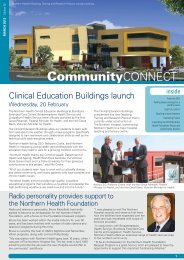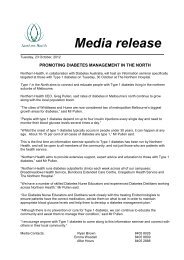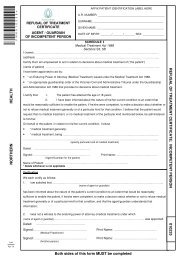Research Week Abstract Book - Northern Health
Research Week Abstract Book - Northern Health
Research Week Abstract Book - Northern Health
You also want an ePaper? Increase the reach of your titles
YUMPU automatically turns print PDFs into web optimized ePapers that Google loves.
Women’s <strong>Health</strong> and Paediatrics<br />
CRP VERSUS I/T RATIO IN SUSPECTED NEONATAL SEPsis<br />
De Silva M, Fan WQ.<br />
The Department of Paediatrics, <strong>Northern</strong> Hospital, Melbourne, Australia.<br />
Background:<br />
The management of neonatal sepsis is difficult because clinical presentations are non-specific, and laboratory testing lacks<br />
sensitivity and specificity. This retrospective study evaluates the use and effectiveness of C-reactive protein (CRP) and<br />
immature: total neutrophil ratio (I/T-ratio) as markers of the status of neonatal infection during antibiotic therapy.<br />
Methods:<br />
Retrospective patient data (n= 136) was collected on neonates of gestational age 33- 42 weeks admitted to The <strong>Northern</strong><br />
Hospital special care nursery (SCN) for suspected neonatal sepsis treated with at least 2 days of IV antibiotics from<br />
September 2010 to August 2011. Data included: maternal risk factors, neonatal risk factors, clinical signs of neonatal infection<br />
and outcomes, CRP (measured via the turbidimetric method) and I/T-ratios (raised CRP >8.0mg/L; I/T-ratio > 0.2). The<br />
cohort was divided into clinically well and unwell subgroups. For paired data , CRP and I/T-ratio were compared statistically<br />
(well n=35, unwell n=80). Regression analysis was performed on CRP and I/T-ratio versus antibiotic duration (well n=42,<br />
unwell n=94).<br />
Results:<br />
More than 40% of all paired CRP and I/T-ratio data signaled opposite infection status. In the unwell group the paired data<br />
was significantly discordant (p

















